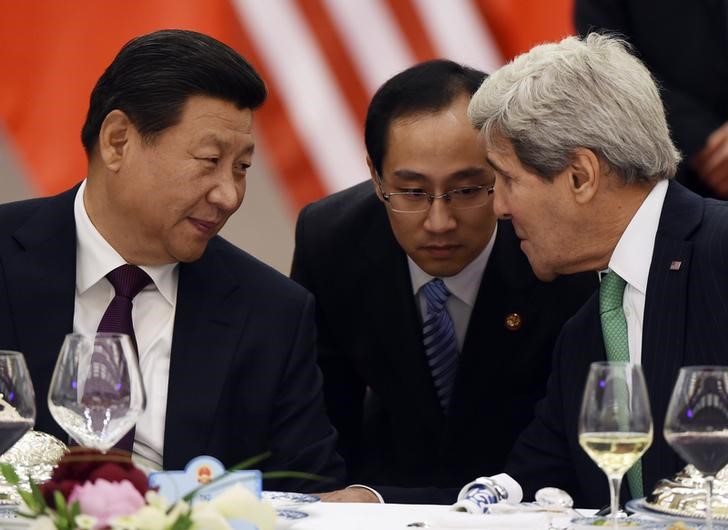By David Brunnstrom
WASHINGTON (Reuters) - U.S. Secretary of State John Kerry will leave China "in absolutely no doubt" about Washington's commitment to ensuring freedom of navigation and flight in the South China Sea when he visits Beijing this weekend, a senior State Department official said on Wednesday.
Setting the scene for what could be contentious encounters with Chinese leaders, including President Xi Jinping, the official said Kerry would warn that China's land-reclamation work in contested waters could have negative consequences for regional stability - and for relations with the United States.
On Tuesday, a U.S. official said the Pentagon was considering sending military aircraft and ships to assert freedom of navigation around rapidly growing Chinese-made artificial islands in the disputed South China Sea.
China's Foreign Ministry responded by saying that Beijing was "extremely concerned" and demanded clarification.
U.S. Assistant Secretary of Defense David Shear told a Senate hearing the United States had right of passage in areas claimed by China. "We are actively assessing the military implications of land reclamation and are committed to taking effective and appropriate action," he said, but gave no details.
The senior State Department official said "the question about what the U.S Navy does or doesn't do is one that the Chinese are free to pose" to Kerry in Beijing, where he is due on Saturday for meetings with civilian and military leaders.
Kerry's trip is intended to prepare for the annual U.S.-China Strategic and Economic Dialogue next month in Washington and Xi's expected visit to Washington in September. But growing strategic rivalry rather than cooperation look set to dominate.
China's Foreign Ministry spokeswoman Hua Chunying said that freedom of navigation did not mean that foreign military ships and aircraft can enter another country's territorial waters or airspace at will.
On Thursday, influential Chinese tabloid the Global Times warned that the United States was risking a showdown if it sends its military to the South China Sea.
"If Washington takes this dangerous step, it will be nothing but a blatant infringement of China's sovereignty, and the U.S. can expect potent countermeasures," it said in an editorial in both its Chinese and English language editions.
"YOU CAN'T BUILD SOVEREIGNTY"
The State Department official dismissed the idea that constructing islands out of half-submerged reefs gave China any right to territorial claims.
"Ultimately no matter how much sand China piles on top of a submerged reef or shoal ... it is not enhancing its territorial claim. You can't build sovereignty," he said.
"He (Kerry) will leave his Chinese interlocutors in absolutely no doubt that the United States remains committed to maintaining freedom of navigation and to exercise our legitimate rights as pertaining to over flight and movement on the high seas."
He said Kerry would "reinforce ... the very negative consequences to China's image and China's relationship with its neighbors on regional stability and potentially on the U.S.- China relationship from their large-scale reclamation efforts and the behavior generally in the South China Sea."
Beijing claims sovereignty over most of the South China Sea, through which $5 trillion in ship-borne trade passes every year. The Philippines, Vietnam, Malaysia, Taiwan and Brunei have overlapping claims.
Last month, the U.S. military commander for Asia, Admiral Samuel Locklear, said China could eventually deploy radar and missile systems on the islands it is building in the Spratly archipelago that could be used to enforce an exclusion zone should it move to declare one.
The U.S. official who spoke on Tuesday said U.S. Defense Secretary Ash Carter had requested options that include sending aircraft and ships within 12 nautical miles (22 km) of the reefs China has been building up.
U.S. President Barack Obama announced a strategic shift toward Asia in 2011 in response to growing Chinese power and influence, but critics have questioned his commitment to this "rebalance" given U.S. security distractions elsewhere in the world and stretched resources.
News of the possibly tougher U.S. stance came as the key economic pillar of the rebalance suffered a blow at the hands of Obama's Democrats in the U.S. Senate, who blocked debate on a bill that would have smoothed the path for a 12-nation Trans-Pacific Partnership (TPP) trade deal.

Failure to clinch an agreement could damage Washington's leadership image in Asia, where China has been forging ahead with a new Beijing-led Asian Infrastructure Investment Bank (AIIB) seen as a challenge to U.S. global financial leadership.
(Addtional reporting by Phil Stewart and David Alexander, and Ben Blanchard in Beijing; Editing by Emily Stephenson, W Simon, Christian Plumb, Chris Reese and Michael Perry)